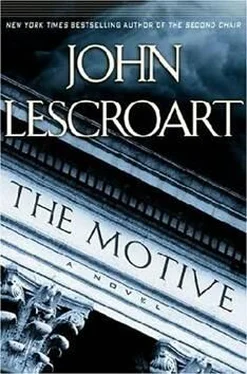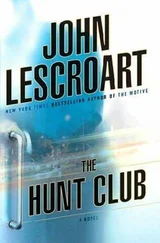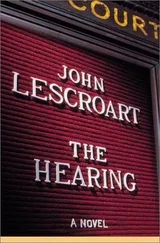Rosen got out of his chair. "Yes, Your Honor."
"Mr. Hardy?"
"Yes, Your Honor."
"All right, Mr. Rosen, you may begin."
Chris Rosen was a professional trial attorney with nine years of experience and a specialization in arson cases. He'd prosecuted three homicides and a dozen arsons in that time, winning four of them outright and getting lesser convictions with substantial prison time on the others. So he could say with absolute truth that he'd never lost a case, which in this most liberal city was an enviable, almost unheard of, record. Maybe Rosen hadn't always gotten a clear win, either, but Hardy knew the truth of the defense bias in San Francisco-indeed, it was one of the factors involved in this case for which he was most grateful-but this was cold comfort as he watched his young, good-looking opposite number rise with a quiet confidence and a friendly demeanor to match it.
"Ladies and gentlemen," he began. "Good morning. We're here today and for the next few days or weeks- let's hope it won't be too many weeks-to hear evidence about the murders of two people, Paul Hanover, a lawyer here in San Francisco, and his fiancee, Missy D'Amiens." Hardy noticed that Rosen came as advertised-he was playing it smooth. He didn't refer to the dead impersonally as "the deceased" or even "the victims." Rather, they had been real, live people until they had been "murdered." He continued to the jury in his serious, amiable voice. "On Wednesday, May the twelfth of last year, someone set a fire at the home that Mr. Hanover shared with Missy D'Amiens. Firemen coming to fight the blaze found the bodies of a man and woman, burned beyond recognition, in the foyer of the house. Wedged under one of the bodies was a gun. Both victims had been shot in the head. The evidence will show beyond a reasonable doubt that neither wound was self-inflicted. Neither victim killed the other and then him- or herself. These people were murdered in their home, and the murderer lit a fire in the hope of destroying the evidence that would connect him or her to the crime."
Rosen paused to collect himself, as these grisly and dramatic events would obviously upset the psyche of any reasonably sensitive person. Clearing his throat, excusing himself to the jurors "for just a moment," he took a few steps over to his desk, where Cuneo pushed his glass of water to the front edge of the desk. Rosen took a sip, cleared his throat again and turned back to the jurors.
"We will prove to you, ladies and gentlemen, and prove beyond a reasonable doubt, that the person who fired those shots into the heads of each of these victims was the defendant in this case, Mr. Hanover's daughter-in-law, Catherine Hanover. She did it for a common and mundane reason-Mr. Hanover was going to change his will and name Missy D'Amiens his beneficiary. When he did that, his inheritance of nearly fifteen million dollars would go to Missy, and the defendant would get no share of it.
"On the very day that he died, according to the defendant's own statement to police, Mr. Hanover told her that he was thinking of changing his will in favor of Missy before the wedding date, possibly as early as the following week. Spurred by this confession of his plans, the defendant resolved to kill Mr. Hanover before he could change his will."
Here Rosen turned and faced Catherine, his body language as well as his tone suggesting that it pained him to make these accusations against a fellow human being. But she had brought it on herself; he so wished that she hadn't. He raised an almost reluctant hand until his arm was fully outstretched, his index finger wavering in controlled indignation. "And shoot him she did. At point-blank range, in the head. And shot Missy D'Amiens, too, because she'd had the bad fortune to come home and be in the house."
Recounting the tale was imposing a great burden on Rosen, and he needed another sip of water. Hardy thought this was overdoing the sensitivity a bit, and he was glad to see something about which he could- privately, at least-be critical. He knew that juries had a way of sniffing out a phony, tactical interruption, and they might resent it. Otherwise, Rosen was presenting a textbook opening statement-recounting the facts the prosecution had and would prove, without any editorializing. He had even avoided the potential minefield of Missy's presence in the house-clearly the killer had intended the scene to look like a murder/suicide, which would have ended the investigation before it began. But Rosen didn't accuse Catherine of that. He steered clear altogether. Hardy, with a grudging admiration, had to let him continue unchallenged.
"The relevant events of this tragic day are relatively straightforward and really began around noon. We will prove to you that the defendant, Catherine Hanover, stopped at a Valero gas station on the corner of Oak and Webster, about three blocks from Paul Hanover's home on Alamo Square. A worker at that gas station will testify that he saw the defendant get out of her car, a black Mercedes-Benz C240, and fill a portable container with gasoline and put it into her trunk.
"According to the defendant's own statement, she went to visit her father-in-law later that same afternoon to discuss the finances of her immediate and extended family. We will show you that the defendant came back to Mr. Hanover's home later in the day. You will hear two witnesses testify that she left Mr. Hanover's home a few moments before the fire broke out. You will discover that the defendant lied to the police about her actions at this time. She said that she was at home alone during these critical hours. But her own daughter's diary disproves her story."
Hardy covered his mouth with his hand, hiding from the jury his displeasure. Heather's diary was perhaps the biggest issue he'd lost in pretrial. Although Hardy had argued bitterly against its inclusion, there was no question ofthe importance and relevance ofthe diary entry. So one way or another, it was going in. And in the normal course of events, that evidence couldn't have been admitted-it wouldn't have had a foundation-if Heather as a prosecution witness against her own mother didn't testify in court that she'd written it. Understandably, this was a scenario that Catherine, in a genuine display of motherly protectiveness, wanted to avoid at all costs. The psychological damage to her daughter could be incalculable. But Rosen needed the evidence, which meant he needed Heather. And no one could stop him from forcing her to testify. The only solution had been for Hardy to cut a deal to allow the diary entry without the foundation. But even without Heather's testimony, it was a bitter pill, and potentially devastating for his client.
Meanwhile, Rosen was gliding easily over the last of the evidence. "Finally, you will learn that the same type of gasoline used as an accelerant to start the fire in Mr. Hanover's home exactly matches that found in fibers of rug from the trunk of the defendant's black Mercedes-Benz C240." He paused for one last sip of water.
"As I said at the outset, this is a straightforward story, and I'm nearly through with it. On May the twelfth of last year, Paul Hanover himself told the defendant that within days, she and her entire family would be written out of her father-in-law's will. That they would lose millions of dollars. She decided to kill him to keep that from happening, and to use his own gun that she knew he kept loaded in the headboard of his bed. She bought gasoline to set Paul Hanover's house on fire to cover her tracks. She had the means. By her own admission, she'd been at the house during the afternoon, and you will hear witnesses place her there again just before the fire broke out. Opportunity."
Rosen let out a little air. "We will show you, and prove beyond a reasonable doubt, that Catherine Hanover killed her father-in-law, Paul Hanover, and Missy D'Amiens for money by shooting them both in the head. This is first-degree murder with special circumstances under the law of the State of California, and that is the verdict I will ask for. Thank you very much."
Читать дальше












